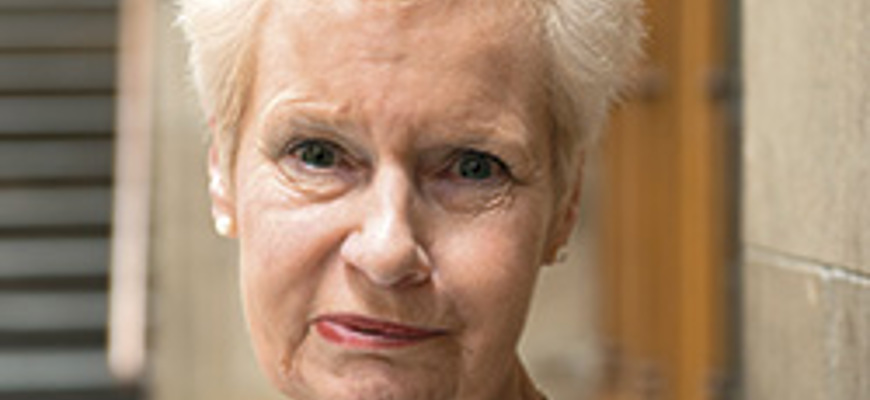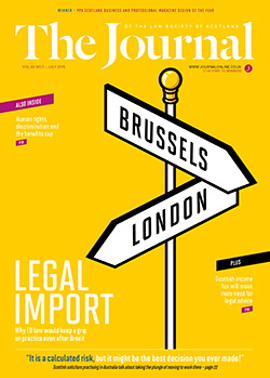Chapter and verse

What was the career path to your current position?
At school, my original intention was to study chemistry at university, but I thought, why not do something that isn’t a school subject? I have never regretted doing law. I have always enjoyed reading cases and trying to work out the underpinning principles. There is so much human interest too. When I studied at Edinburgh University, female law students were a very small proportion of the annual intake. How that’s all changed for the better! I served an apprenticeship, and then as a court assistant, with Dundas & Wilson. I joined Ross Harper & Murphy in 1976 as they set up an Edinburgh office. I moved in-house in 1981 to join the Church’s Law Department, first as Depute Solicitor and then from 1995 as Solicitor of the Church. I was brought up in the Church, my father was an elder and there was an obvious attraction in being involved in its work.
What is your team’s main function and how it is structured? How much input do you have in business strategy and governance?
One of the first to see the benefits of having its own employed solicitors, the Church has had an in-house legal function since 1938. There are eight other solicitors and seven support staff, which may surprise, but we are kept busy. Our main function is to provide legal advice and support for the Church’s 1,400 congregations, 46 presbyteries at regional level and also the national councils, committees, statutory corporations and various Church trusts.
As you might expect, this produces a very varied workload. Property law, charity law, contracts, and compliance areas such as data protection and health and safety are all important. One organisation used to address mail to us as “the Church of Scotland War Department”. My role combines the post of Law Agent of the General Assembly, the Church’s supreme body. The post carries automatic membership of the Assembly. In addition, I am a member of the Council of Assembly, which operates as a type of executive body between Assemblies, and various other committees including the Legal Questions Committee. The Church of Scotland Act 1921 recognised the Church’s separate spiritual jurisdiction and its right to run its own affairs without state interference in matters of doctrine, worship, government and discipline. However, life is more complicated these days, and issues such as equality law and human rights increasingly overlap.
What is a typical working day for you?
No two days are the same, but generally I have at least one committee meeting and several meetings with “clients”. I may also have a meeting connected with my role as secretary of the Scottish Churches Committee, which represents all the main religious denominations in non-secular matters of common interest. Responding to communications takes up a good chunk of time, and I prefer not to deal with complex matters by email. I also monitor legislation for the Church and spend time going through parliamentary bills etc. And it’s important that the rest of the team can come and discuss any problems or complexities they face. Some church title deeds are not for the fainthearted!
What motivates you on a Monday morning?
I enjoy tackling problems and helping people. Whilst it’s not possible to solve everything, I still get a buzz out of trying.
What do you enjoy about working in-house?
It’s the nature of the Church that you are dealing with on a daily basis with an incredible variety of people from all over Scotland, and beyond as the Church has congregations in England and Europe plus a few former colonial outposts. To publicise our services, we produced a leaflet “Keep Calm and Call the Law Department”. We have dedicated pages on the Church website from which congregations can download many free resources. Working in-house also means you are relieved of some of the downsides of private practice such as “business development” and time recording. So, really, what’s not to like? It’s fascinating to be involved in a body with such a long history, interesting traditions and its own mini-legal system.
Along with a lot of hard work come some unique moments. General Assembly week is always busy, and this now includes taking part in the Heart and Soul event in Princes Street Gardens where we don distinctive T-shirts. Our “Hug a lawyer* *Terms and Conditions apply” T-shirt has proved the most popular! It is a great chance to meet some of the local people we deal with by phone and email. At the Assembly, the Lord High Commissioner represents the Queen and therefore is entitled to use a car with no number plate, much to the bemusement of a traffic warden who tried to ticket it!
Has your organisation experienced any major change recently?
The Church adopts the principle “semper reformanda”, although it’s the nature of Presbyterianism that significant change takes quite a while. The Church’s Barrier Act passed in 1697 (known as the Act anent Hasty Change) requires substantial innovations to be agreed to, first by a General Assembly, then a majority of presbyteries, with the proposals only becoming law if passed by the General Assembly the following year. The Church has been wrestling for a number of years with the issue of ministers in same sex relationships, and legislation was passed this year to allow individual kirk sessions, when seeking a new minister, to agree to consider appointing a minister in a civil partnership. It remains to be seen whether this will be extended to same sex marriages, or indeed whether the Church will agree to allow ministers the option to solemnise these.
What makes a good in-house lawyer? What’s your advice for young lawyers on an in-house career?
I would say it’s having the ability to communicate well and tailor the message for your audience. Mostly people are not interested in getting long lectures as to what the law is; rather they want to be told the pros and cons of the possible courses of action, with a firm and clear recommendation. You need to be more proactive than in private practice. I also suggest getting as wide as possible a knowledge of the law. In many in-house roles, you need to be much more a generalist than a specialist.
What do you look for when you seek external legal advice? How do you see the in-house/external legal relationship changing?
We very rarely seek external legal advice except in specialist areas such as pensions law or for legal work outwith Scotland. In such cases, where possible, we prefer those with a working knowledge of the Church and its structures. Since 1638, the Church has appointed its own standing counsel known as the Procurator of the Church, who attends the General Assembly, provides opinions and represents the Church in any litigation in the higher courts. The current Procurator is Laura Dunlop QC, who had to speak at some length at this year’s Assembly on the legal ramifications surrounding the possible repeal of the Human Rights Act.
What are the current hot legal topics in your sector, and how does the future look for in-house lawyers?
The Church is an organisation with large property holdings, mainly still in the Register of Sasines. The new land registration procedures and the Government’s proposal that all property should move to the Land Register within 10 years are presenting a challenge, as are aspects of the current discussions around land reform. The new political landscape, questions of increased devolution and the in/out EU referendum will inevitably have legal implications for the Church. I am sure that legal expertise will continue to remain in high demand and that the future for in-house lawyers looks rosy.
Does Scottish legal education and training provide the necessary skills for working in-house in your organisation?
I think it provides a very good foundation. It is, however, quite a sharp learning curve to get up to speed with the range of work here. I usually say to new solicitors that it probably takes five years to suss out all the wrinkles and get a working knowledge of Church law. Even after 30-odd years, I still occasionally come across something new. In our team, all the solicitors do some property law, but due to the breadth of work they usually develop specialisms such as food hygiene law, charity law, health and safety law etc.
How do you think in-house lawyers today are perceived among the wider legal profession?
I’m glad to say that perceptions are greatly improved from 20 or so years ago when in-house lawyers were to an extent looked down upon by those in private practice.
You used to be on the ILG committee. What did you enjoy most about this role and how do you see the ILG’s current remit developing?
I think the committee is responsible to a fair degree for the improved perception of in-house lawyers. Janet Hood and Colin Anderson deserve full credit for shaking up the rather moribund Public Service & Commerce Group. I certainly enjoyed my time on the committee, especially getting to meet lawyers from other sectors. I think the time has come for the committee to be more integrated into the Society’s structure, whilst naturally feeling a little apprehensive at the potential loss of independence.
What is the most unusual work request you have had?
I had to approve an expenses claim for a dressmaking bill for making a shalwar kameez outfit for one of our female solicitors who was travelling to rural Pakistan on Church business. She being rather tall, the off-the-peg outfits available would have left her ankles exposed and potentially have caused offence. The outfit is now in store at the Church offices along with items including Moderators’ tricorn hats, a full burqa and numerous pith helmets from the days of the traditional missionary.
What keeps you busy outside the office?
I enjoy theatre, opera, cinema, and pilates and other exercise classes. I’m also a trustee of Dr Neil’s Garden at Duddingston Loch in Edinburgh. I cannot recommend it highly enough as a wonderful place to enjoy the plants, the views and the tranquillity. You can get a notion of the place at: www.drneilsgarden.co.uk
What one thing would you take with you to a desert island and why? What one thing would you put in Room 101 and why?
I would say my iPad, but I would need solar power and wifi which I suspect would not be allowed. So I think it would be an endless supply of old-fashioned printed books.
So far as Room 101 is concerned, after my trip to London this week it would have to be the new security hall at Edinburgh Airport.
In this issue
- Caught by the cartels
- Refugees: why article 31 matters
- Virtual victims?
- How much should trainee solicitors be paid?
- Reading for pleasure
- Opinion: Malcolm Combe
- Book reviews
- Profile
- President's column
- Plans reports: yes or no?
- Farewell Brussels?
- Mind games
- Justifying discrimination
- Advance to Australia fair
- People on the move
- Reason for the rules
- Beware the (new) transfer traps
- Pension schemes: the VAT rules change
- Tenancies and the Land Reform Bill
- Scottish Solicitors Discipline Tribunal
- Are you ready for counterpart signing?
- Chapter and verse
- Street Law: a wildfire success
- Law reform roundup
- ADR directive affects complaints
- From the Brussels office
- Transforming perceptions
- Litigators in a fix?
- Unlucky Fridays?
- Flag up, or keep mum?
- Send in the auditors






